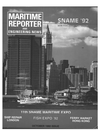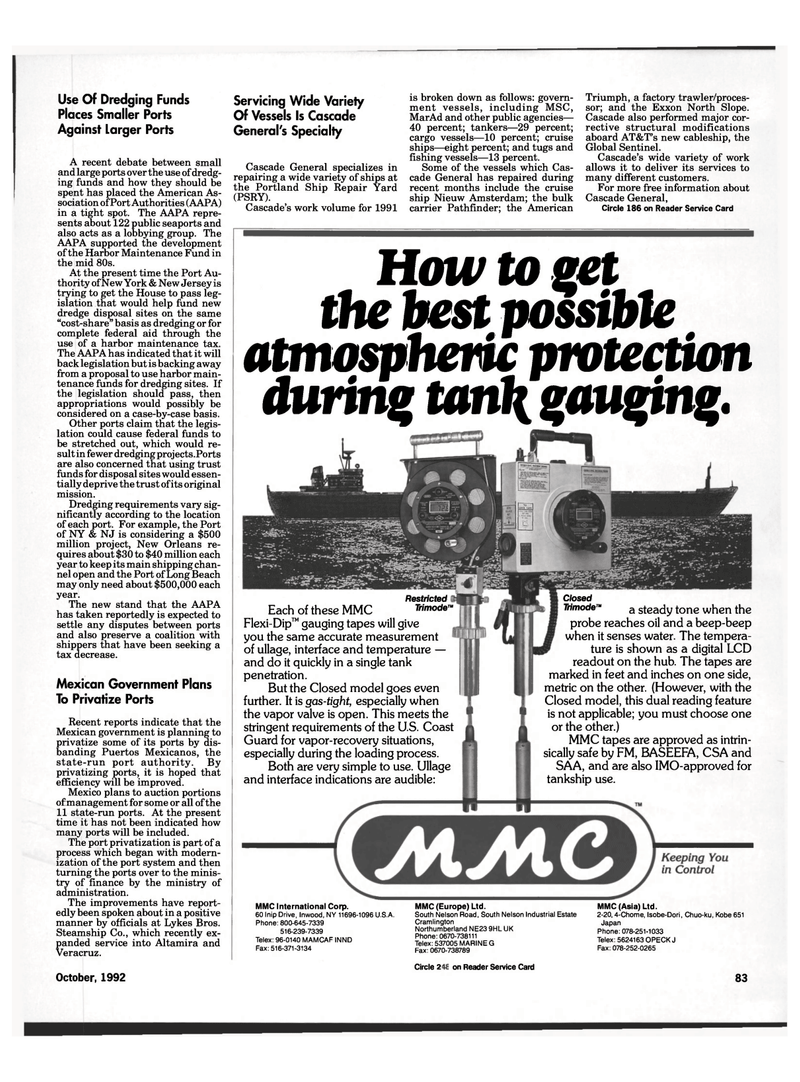
Page 82: of Maritime Reporter Magazine (October 1992)
Read this page in Pdf, Flash or Html5 edition of October 1992 Maritime Reporter Magazine
Use Of Dredging Funds
Places Smaller Ports
Against Larger Ports
A recent debate between small and large ports over the use of dredg- ing funds and how they should be spent has placed the American As- sociation of Port Authorities (AAPA) in a tight spot. The AAPA repre- sents about 122 public seaports and also acts as a lobbying group. The
AAPA supported the development of the Harbor Maintenance Fund in the mid 80s.
At the present time the Port Au- thority of New York & New Jersey is trying to get the House to pass leg- islation that would help fund new dredge disposal sites on the same "cost-share" basis as dredging or for complete federal aid through the use of a harbor maintenance tax.
The AAPA has indicated that it will back legislation but is backing away from a proposal to use harbor main- tenance funds for dredging sites. If the legislation should pass, then appropriations would possibly be considered on a case-by-case basis.
Other ports claim that the legis- lation could cause federal funds to be stretched out, which would re- sult in fewer dredging projects. Ports are also concerned that using trust funds for disposal sites would essen- tially deprive the trust of its original mission.
Dredging requirements vary sig- nificantly according to the location of each port. For example, the Port of NY & NJ is considering a $500 million project, New Orleans re- quires about $30 to $40 million each year to keep its main shipping chan- nel open and the Port of Long Beach may only need about $500,000 each year.
The new stand that the AAPA has taken reportedly is expected to settle any disputes between ports and also preserve a coalition with shippers that have been seeking a tax decrease.
Mexican Government Plans
To Privatize Ports
Recent reports indicate that the
Mexican government is planning to privatize some of its ports by dis- banding Puertos Mexicanos, the state-run port authority. By privatizing ports, it is hoped that efficiency will be improved.
Mexico plans to auction portions of management for some or all of the 11 state-run ports. At the present time it has not been indicated how many ports will be included.
The port privatization is part of a process which began with modern- ization of the port system and then turning the ports over to the minis- try of finance by the ministry of administration.
The improvements have report- edly been spoken about in a positive manner by officials at Lykes Bros.
Steamship Co., which recently ex- panded service into Altamira and
Veracruz.
October, 1992
Servicing Wide Variety
Of Vessels Is Cascade
General's Specialty
Cascade General specializes in repairing a wide variety of ships at the Portland Ship Repair Yard (PSRY).
Cascade's work volume for 1991 is broken down as follows: govern- ment vessels, including MSC,
Mar Ad and other public agencies— 40 percent; tankers—29 percent; cargo vessels—10 percent; cruise ships—eight percent; and tugs and fishing vessels—13 percent.
Some of the vessels which Cas- cade General has repaired during recent months include the cruise ship Nieuw Amsterdam; the bulk carrier Pathfinder; the American
Circle 152 on Reader Service Card
Triumph, a factory trawler/proces- sor; and the Exxon North Slope.
Cascade also performed major cor- rective structural modifications aboard AT&T's new cableship, the
Global Sentinel.
Cascade's wide variety of work allows it to deliver its services to many different customers.
For more free information about
Cascade General,
Circle 186 on Reader Service Card 83
MMC International Corp. 60 Inip Drive, Inwood, NY 11696-1096 U.S.A.
Phone: 800-645-7339 516-239-7339
Telex: 96-0140 MAMCAF INND
Fax: 516-371-3134
MMC (Europe) Ltd.
South Nelson Road, South Nelson Industrial Estate
Cramlington
Northumberland NE23 9HL UK
Phone: 0670-738111
Telex: 537005 MARINE G
Fax: 0670-738789
MMC (Asia) Ltd. 2-20, 4-Chome, Isobe-Dori, Chuo-ku, Kobe 651
Japan
Phone: 078-251-1033
Telex: 5624163 OPECK J
Fax: 078-252-0265
How to get the best possible atmospheric protection during tan1{ gauging.
Restricted
Each of these MMC Trimode™
Flexi-Dip™ gauging tapes will give you the same accurate measurement of ullage, interface and temperature — and do it quickly in a single tank penetration.
But the Closed model goes even further. It is gas-tight, especially when the vapor valve is open. This meets the stringent requirements of the U.S. Coast
Guard for vapor-recovery situations, especially during the loading process.
Both are very simple to use. Ullage and interface indications are audible:
Closed
Trimode™ a steady tone when the probe reaches oil and a beep-beep when it senses water. The tempera- ture is shown as a digital LCD readout on the hub. The tapes are marked in feet and inches on one side, metric on the other. (However, with the
Closed model, this dual reading feature is not applicable; you must choose one or the other.)
MMC tapes are approved as intrin- sically safe by FM, BASEEFA, CSA and
SAA, and are also IMO-approved for tankship use.

 81
81

 83
83
